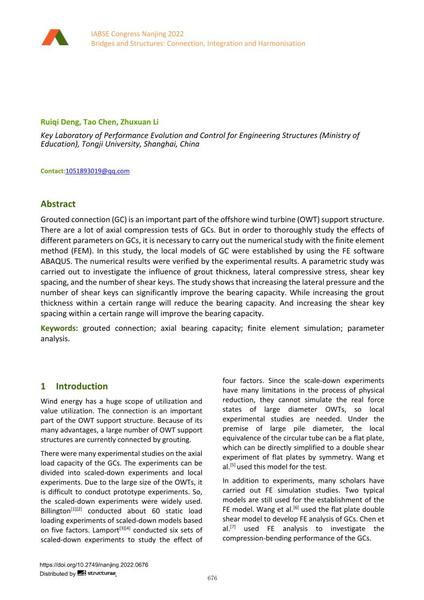Study on the Bearing Capacity of Grouted Connections with Shear Keys

|
|
|||||||||||
Bibliographic Details
| Author(s): |
Ruiqi Deng
(Key Laboratory of Performance Evolution and Control for Engineering Structures (Ministry of Education), Tongji University, Shanghai, China)
Tao Chen (Key Laboratory of Performance Evolution and Control for Engineering Structures (Ministry of Education), Tongji University, Shanghai, China) Zhuxuan Li (Key Laboratory of Performance Evolution and Control for Engineering Structures (Ministry of Education), Tongji University, Shanghai, China) |
||||
|---|---|---|---|---|---|
| Medium: | conference paper | ||||
| Language(s): | English | ||||
| Conference: | IABSE Congress: Bridges and Structures: Connection, Integration and Harmonisation, Nanjing, People's Republic of China, 21-23 September 2022 | ||||
| Published in: | IABSE Congress Nanjing 2022 | ||||
|
|||||
| Page(s): | 676-685 | ||||
| Total no. of pages: | 10 | ||||
| DOI: | 10.2749/nanjing.2022.0676 | ||||
| Abstract: |
Grouted connection (GC) is an important part of the offshore wind turbine (OWT) support structure. There are a lot of axial compression tests of GCs. But in order to thoroughly study the effects of different parameters on GCs, it is necessary to carry out the numerical study with the finite element method (FEM). In this study, the local models of GC were established by using the FE software ABAQUS. The numerical results were verified by the experimental results. A parametric study was carried out to investigate the influence of grout thickness, lateral compressive stress, shear key spacing, and the number of shear keys. The study shows that increasing the lateral pressure and the number of shear keys can significantly improve the bearing capacity. While increasing the grout thickness within a certain range will reduce the bearing capacity. And increasing the shear key spacing within a certain range will improve the bearing capacity. |
||||
| Keywords: |
finite element simulation grouted connection parametric analysis axial bearing capacity
|
||||
| Copyright: | © 2022 International Association for Bridge and Structural Engineering (IABSE) | ||||
| License: | This creative work is copyrighted material and may not be used without explicit approval by the author and/or copyright owner. |
||||
